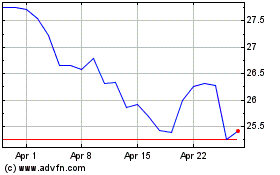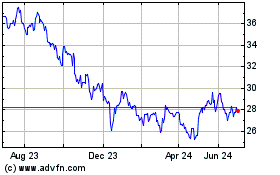Purchase of Array BioPharma for $10.64 billion shows strategic
focus on segment
By Jared S. Hopkins and Kimberly Chin
This article is being republished as part of our daily
reproduction of WSJ.com articles that also appeared in the U.S.
print edition of The Wall Street Journal (June 18, 2019).
Pfizer Inc. agreed to buy Array BioPharma Inc. for $10.64
billion in cash, as one of the world's biggest pharmaceutical
companies seeks to expand its cancer lineup with targeted
therapies.
Monday's deal for Array, which garnered a 62% premium to its
closing price Friday, suggests just how important the market for
cancer drugs is for the world's biggest pharmaceutical
companies.
Pfizer has been trying to expand its offerings through a
combination of deals as well as by ramping up its own
drug-discovery efforts. The deal for Array includes two drugs in an
increasingly important segment of the market: for agents that
target genetic changes driving the cancers of certain patients.
Array's two drugs, Braftovi and Mektovi, are currently approved
to treat skin-cancer patients with certain genetic alterations. The
drugs could also play a role in treating some colon and rectal
cancer patients, if studies pan out.
Like a lot of big drugmakers, Pfizer has been trying to beef up
its portfolio of cancer drugs to tap into a market projected to
reach $237 billion in 2024 world-wide sales, up from $138 billion
this year, according to research firm EvaluatePharma.
Also appealing to the big companies is the ability to command
high prices and the opportunities to find new treatments furnished
by advances understanding the disease.
For Pfizer, the shift has meant moving away from the widely used
pills like cholesterol fighter Lipitor and male-impotence treatment
Viagra that the company had long been known for. Pfizer's 18 cancer
drugs include three less-expensive copies of biotech drugs known as
biosimilars.
Pfizer's cancer drugs are projected to generate $8.3 billion in
sales this year, according to EvaluatePharma.
Big company interest in cancer has driven many recent
acquisitions -- and high premiums. Last month, Merck & Co.
agreed to acquire Peloton Therapeutics Inc. for about $1 billion,
while Bristol-Myers Squibb Co. in January announced a $74 billion
deal for Celgene Corp.
Targeted cancer treatments are a special area of focus, fueling
takeouts like Eli Lilly & Co.'s roughly $8 billion deal for
Loxo Oncology. Lilly paid a 68% premium for Loxo and its drugs
based on tumors' genetic traits.
Braftovi and Mektovi, which are taken together, each carry a
monthly list price of approximately $11,000. In May, the
combination showed positive results in a late-stage study of
patients with advanced colon cancer.
Andy Schmeltz, who heads Pfizer's cancer business, expressed
hope that the two drugs would play a major role in improving
treatment for colon cancer, a leading cause of cancer-related
deaths in the U.S.
An estimated 145,600 patients in the U.S. will be diagnosed with
cancer of the colon and rectum this year, according to the American
Cancer Society, and more than 51,000 people are expected to die
from the diseases.
Analysts expect Array's annual product sales will reach $1
billion by 2023, according to FactSet. The company also has several
drugs in clinical development that are being tested in
patients.
Targeted cancer drugs like those from Array are among those that
Pfizer has prioritized in recent years, especially as the company
looks forward to the increasing use of the therapies in combination
with other cancer treatments.
"The future of cancer medicines are combinations," Chris
Boshoff, who leads Pfizer's cancer drug development, said in an
interview. "A big part of that will be targeted cancer
medicines."
Boulder, Colo.-based Array was founded in 1998 by three former
scientists at Amgen Inc. -- Kevin Koch, Anthony Piscopio and David
Snitman -- as well as chemistry professor K.C. Nicolaou, now at
Rice University in Houston.
Pfizer Chief Financial Officer Frank D'Amelio told analysts on a
conference call the company will continue to search for small and
midsize deals, and isn't dependent on larger acquisitions for
growth.
Under the terms, Pfizer said it would pay Array shareholders $48
for each of its shares outstanding, a 62% premium to the closing
price Friday. Pfizer said it would fund the transaction with debt
and existing cash, and expects it to close by year's end.
Shares of Array climbed 57% to $46.50 in early afternoon trading
Monday, while Pfizer slipped 5 cents to $42.71.
Pfizer said it expects the transaction to hit adjusted per-share
earnings by 4 cents to 5 cents in 2019 and 4 cents to 5 cents in
2020. Pfizer expects the deal to add to earnings at the beginning
of 2022.
Write to Kimberly Chin at kimberly.chin@wsj.com
(END) Dow Jones Newswires
June 18, 2019 02:47 ET (06:47 GMT)
Copyright (c) 2019 Dow Jones & Company, Inc.
Pfizer (NYSE:PFE)
Historical Stock Chart
From Mar 2024 to Apr 2024

Pfizer (NYSE:PFE)
Historical Stock Chart
From Apr 2023 to Apr 2024
